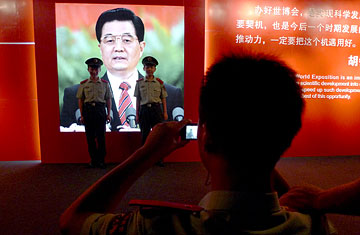
Two Chinese paramilitary officers stand in front of a portrait of Chinese President Hu Jintao at a promotion exhibition for the 2010 Shanghai World Expo at the Capital Museum in Beijing on July 12, 2009
July has been a trying month for China's President, Hu Jintao. First he was forced to scurry home from Italy to deal with race riots in western Xinjiang province that left some 190 dead. His departure just ahead of the opening of the G-8 summit at which China was slated to play a key role must have been embarrassing. So unprecedented was the decision that it prompted some Sinologists to wonder whether a shaky political position at home was the real reason Hu decided to cancel.
Then in mid-month came reports that Nuctech, a company whose CEO was until last year the President's son Hu Haifeng, is the focus of a corruption investigation in Namibia. Investigators in the African nation have reportedly requested that the 38-year-old Hu testify as a witness (though not as a suspect) in a probe into how a lucrative government contract was won by Nuctech, a maker of security-screening devices used in airports and seaports. News of the investigation is so sensitive in China that tight controls imposed on the Internet have been tightened even further. Chinese social-networking sites were blocked (access to overseas sites such as Twitter and Facebook was already barred), and Web censors have cut off Internet searches using keywords and phrases including Hu Haifeng, Namibia and Nuctech, according to the China Digital Times, a news site based at the University of California, Berkeley.
There no doubt as to why the subject is so sensitive. Whenever an authoritarian leader's children are the subject of scandal, a potential avenue of attack for that leader's enemies is opened. Hu Jintao is no different. At the top levels of the ruling Communist Party, power is balanced almost evenly between Hu's supporters and their main opponents, the "princelings," a lose amalgamation of the offspring and relatives of former senior party officials. Signs of a power struggle were already evident to some scholars earlier this year, when several senior party officials in Guangdong province and the port city of Tianjin were arrested for corruption. "Corruption arrests are tools [party members] use to launch attacks against each other," says Victor Shih, who teaches political science at Northwestern University and has written a book on élite Chinese politics. Because corruption is so widespread in China, says a Western diplomat in the capital, any senior-level arrest is seen as politically motivated. "You could throw a stone into a crowd of senior cadres in any province and hit someone who could be prosecuted for corruption," the diplomat says. "So when senior guys get taken out, it's time to sit up and take notice."
Certainly there are reasons to think a power grab could be triggered if, as Shih puts it, "they find some dirt on one of the top leaders." Hu is increasingly a lame duck. He is set to retire in 2012, after his second five-year term as President and Communist Party General Secretary.
Paradoxically, it may be the very absence of a dominant leader that makes China's existing system more stable than it sometimes might appear to outsiders. That's because there are no individuals strong enough to make a play for controlling power. "Collective leadership means weak leaders and strong factions," says Cheng Li of the Brookings Institution in Washington. Moreover, Beijing's leaders of the current generation all have vivid memories of the potentially devastating consequences of an open schism in the top ranks of the party. "What happened in Tiananmen in 1989 was a consequence of a split in the leadership," says Shih, "and whatever happens, the last thing they want is a repeat of 1989."
In fact, despite the challenges he has faced this month and his looming lame-duck status, Hu may actually be at the height of his power, says David Zweig, who teaches political science at the Hong Kong University of Science and Technology. "It takes any new party secretary four to five years just to get the party under control after he takes over," Zweig says. "Having appointed many of his stalwarts to senior (posts), Hu is now probably in a position to exert considerable influence on decisions even after he steps down in 2012 through his control of the Organization Bureau, which controls personnel appointments." For this reason, "There could be some sniping at Hu over crises like Urumqi," says Zweig, "but overall, (the Beijing government) is pretty stable."
